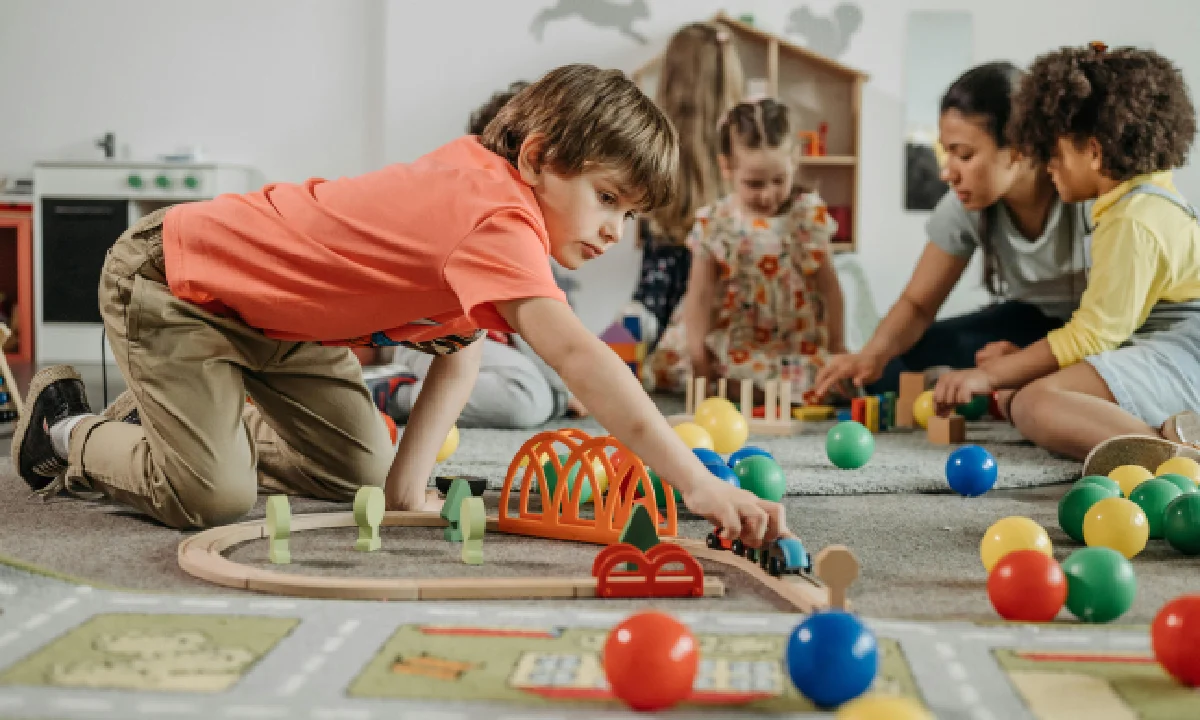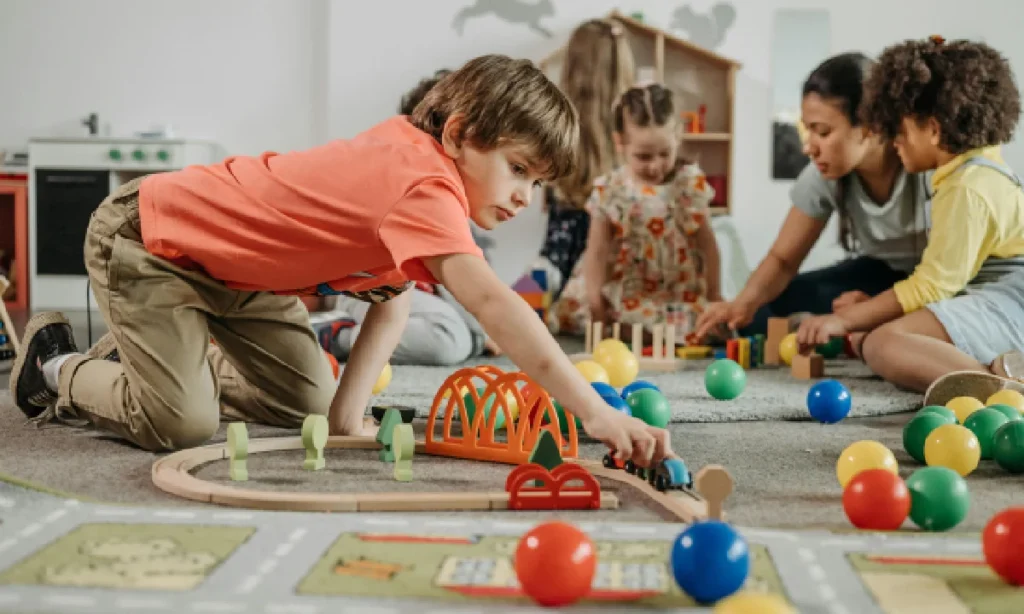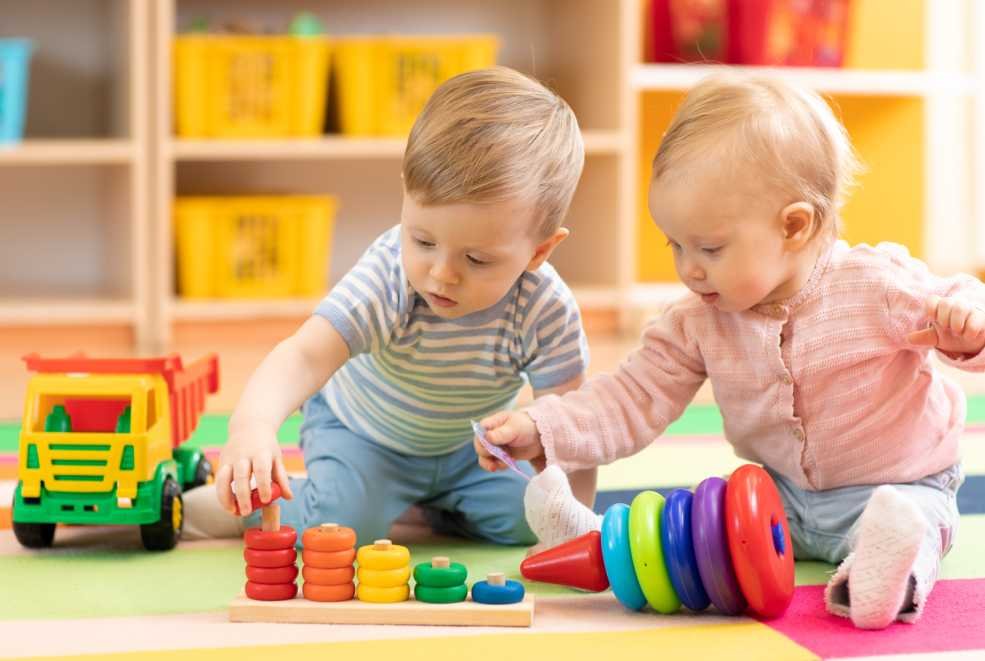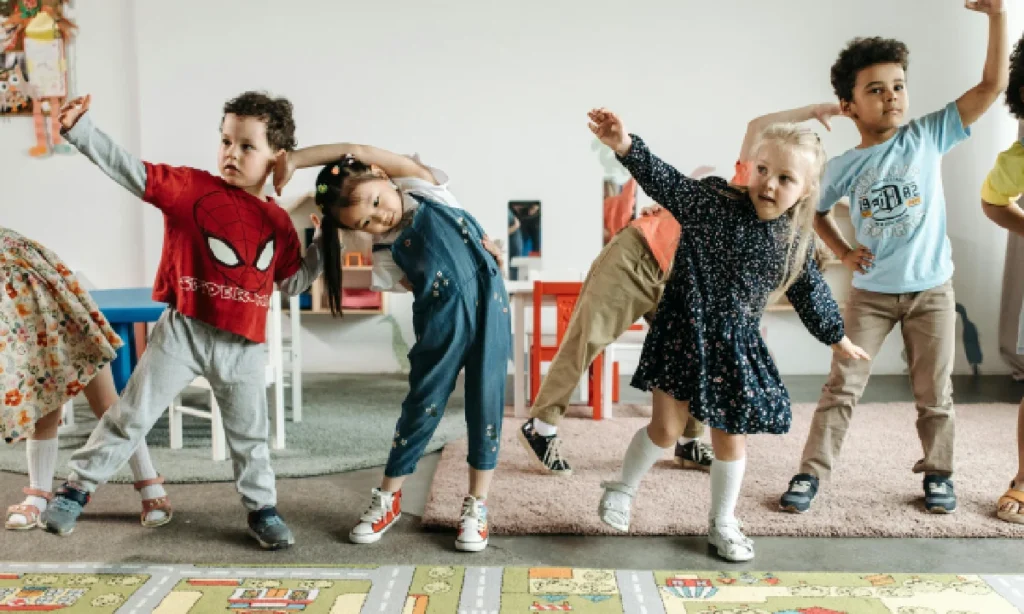
Table of Contents
Introduction
Play is an essential component of learning at Smyrna Day School. Through various play-based activities, children are not only entertained but are also actively developing crucial skills that will benefit them in the long run. The school understands that play is not just about having fun but is a meaningful way for children to explore, experiment, and learn about the world around them. Incorporating play into the curriculum allows children to build strong social skills as they interact with their peers in a relaxed and enjoyable setting.
They learn to take turns, cooperate, communicate effectively, and resolve conflicts – all important skills that will help them navigate the complexities of relationships throughout their lives. Additionally, through play, children develop emotional intelligence by learning to express their feelings, empathize with others, and regulate their emotions.
Moreover, play is a powerful tool for academic development at Smyrna Day School. Through imaginative play, children can practice problem-solving, critical thinking, and creativity. They learn to think outside the box, come up with innovative solutions to challenges, and explore different perspectives. Play also enhances language development as children engage in conversations, storytelling, and role-playing, expanding their vocabulary and communication skills.
By fostering a positive attitude towards play, Smyrna Day School is equipping their students with a strong foundation for future success. Children are encouraged to be curious, imaginative, and resilient – qualities that will serve them well as they continue to learn and grow. The school recognizes that play is not just a break from learning but an integral part of the learning process, shaping well-rounded individuals who are prepared to face the challenges of the modern world.

The Power of Play in Education
Play is a fundamental aspect of a child’s growth and development, serving as a crucial tool for exploration and understanding of the world they inhabit. By engaging in play, children have the opportunity to unleash their imagination, hone their problem-solving abilities, and enhance their critical thinking skills.
Furthermore, play aids in fostering resilience, self-assurance, and autonomy in young individuals. Schools that recognize the significance of play, such as Smyrna Day School, integrate it seamlessly into their educational framework to cultivate a stimulating and interactive atmosphere for their students. This approach not only enriches the learning experience but also nurtures a holistic development of children by promoting a well-rounded skill set that is essential for success in various facets of life.
Embracing play as a vital component of education not only enhances academic performance but also nurtures the emotional and social well-being of children, setting a strong foundation for their future endeavors. By prioritizing play-based learning, schools can create a nurturing environment where students thrive and flourish, ultimately preparing them to navigate the complexities of the modern world with confidence and competence.
Smyrna Day School’s Play-Based Approach
At Smyrna Day School, play is not just a break from learning; it is an essential part of the educational philosophy. As soon as students step into the school, they are welcomed into an environment where play is the primary tool for learning. The teachers at Smyrna Day School understand the importance of hands-on, interactive activities in promoting cognitive, social, and emotional development in children. Through activities like building with blocks, exploring nature, and engaging in dramatic play, students are given the opportunity to learn in a fun and engaging way.
Building with blocks, for example, helps children develop their fine motor skills and spatial awareness, while exploring nature allows them to connect with the world around them and learn about the environment. Dramatic play, on the other hand, fosters creativity, imagination, and social skills as students work together to create stories and scenarios. By incorporating play into the curriculum, Smyrna Day School creates a stimulating environment where students can learn and grow at their own pace.
The freedom to explore and experiment within a structured setting allows children to develop critical thinking skills, problem-solving abilities, and a love for learning. The school recognizes that play is not just a way to keep children entertained, but a fundamental aspect of childhood development that should be nurtured and encouraged. At Smyrna Day School, play is not a break from learning – it is the way in which learning happens.
Building Skills Through Play
Play is not just a frivolous activity for children; it is a crucial part of their development. When children engage in play, they are not only having fun but also honing important skills that will benefit them in various aspects of their lives. At Smyrna Day School, play is woven into the fabric of their curriculum, ensuring that students have ample opportunities to learn through play. Fine motor skills are one of the key areas of development that children can improve through play.
Activities like building with blocks, coloring, and playing with clay help children strengthen their hand-eye coordination and dexterity. These skills are essential for tasks like writing, drawing, and using tools, making them crucial for academic and practical success. Communication skills are another crucial aspect of development that can be nurtured through play. When children engage in imaginative play, they learn to express themselves, listen to others, and work collaboratively. This not only helps them in social situations but also lays the foundation for strong interpersonal relationships in the future.
Incorporating play into the curriculum at Smyrna Day School not only helps children develop these individual skills but also encourages holistic growth. Through play, children learn to problem solve, think creatively, and regulate their emotions. These are skills that are invaluable in navigating the complexities of the modern world. By recognizing the importance of play in child development, Smyrna Day School ensures that their students are not only academically prepared but also equipped with the social and emotional skills necessary for success in life. The joy of play is not just a fleeting moment of fun but a powerful tool for shaping well-rounded individuals who are ready to face whatever challenges come their way.
Social Development Through Play
Play is not only a fun and enjoyable activity for children but also a crucial aspect of their social development. Through play, children have the opportunity to interact with their peers, learn how to cooperate, communicate effectively, and develop empathy. These social skills are essential for navigating relationships and interactions with others as they grow older.
At Smyrna Day School, play is seen as a valuable tool for teaching children how to interact with others in a positive and constructive way. By engaging in play activities with their classmates, students have the chance to practice important social skills in a safe and supportive environment. This hands-on approach to social development helps children build confidence in their ability to connect with others, resolve conflicts peacefully, and cultivate meaningful relationships.
Through guided play experiences, children at Smyrna Day School are encouraged to collaborate, problem-solve, and communicate with one another. These interactions not only promote social skills but also help students develop a sense of empathy and understanding towards their peers. By fostering a supportive and inclusive play environment, the school is able to create a strong foundation for social development that will benefit children both in and out of the classroom.
Overall, the emphasis on play as a means for social development at Smyrna Day School highlights the importance of building strong social skills in children from a young age. By incorporating play into the curriculum, the school is able to provide students with the tools they need to navigate social situations confidently and successfully, setting them up for positive social interactions and relationships in the future.

Emotional Growth in Playful Environments
At Smyrna Day School, children have the opportunity to immerse themselves in a dynamic and interactive environment that is carefully designed to foster emotional development. Through engaging in various forms of play, such as imaginative play, sensory activities, and social interaction, students are encouraged to express their feelings and navigate complex emotions in a supportive setting. This approach not only helps children build resilience and cope with stress but also allows them to develop crucial skills like empathy, communication, and problem-solving.
Furthermore, the incorporation of play into the school’s curriculum enables students to cultivate a deep sense of self-awareness and emotional intelligence. By engaging in role-playing scenarios, storytelling, and creative arts, children are able to explore their own thoughts and feelings, as well as understand the perspectives of others. This process of self-exploration and reflection not only enhances their emotional well-being but also promotes a greater understanding of themselves and those around them.
As a result, Smyrna Day School is able to create a nurturing and inclusive environment where students can thrive emotionally and develop a strong sense of well-being. By prioritizing emotional development through play, the school empowers children to build confidence, form positive relationships, and navigate the complexities of their inner world with resilience and grace. Through play, children at Smyrna Day School are not only learning academic skills but also essential life skills that will serve them well throughout their lives.
Fostering Academic Skills Through Play
Play is not just a simple pastime for children; it serves as a powerful avenue for learning and development. At Smyrna Day School, the incorporation of play into their curriculum goes beyond mere entertainment, as it nurtures essential academic skills in a fun and interactive manner. Through activities like building blocks, puzzles, and pretend play, children are unknowingly practicing mathematical concepts, language skills, and scientific principles.
This hands-on approach not only makes learning enjoyable but also enhances retention and understanding of these subjects. Furthermore, play fosters creativity and critical thinking, essential skills for success in the future. As children engage in imaginative role-playing scenarios or problem-solving games, they are expanding their cognitive abilities and learning how to think outside the box. These skills are transferable to various academic subjects and real-life situations, preparing them for the challenges they may face as they progress through their education and into adulthood.
By encouraging play in the classroom, Smyrna Day School is not only promoting academic growth but also instilling a lifelong love for learning in their students. When children associate learning with fun and excitement, they are more likely to remain curious, motivated, and engaged in their educational journey. This positive attitude towards learning can have a lasting impact on their academic achievements and overall success in life. In essence, play is not just a break from formal education; it is a fundamental building block that shapes the minds and futures of young learners.

Playful Learning at Smyrna Day School
At Smyrna Day School, learning is not just about sitting in a classroom and listening to lectures. The school believes in providing a holistic educational experience where students can develop their skills and knowledge through hands-on activities and real-world experiences. In addition to traditional classroom learning, students have the opportunity to explore outdoor spaces, engage in sensory activities, and participate in dramatic play. Outdoor learning is an essential part of the curriculum at Smyrna Day School. Students have access to a variety of outdoor spaces, including a playground, garden, and nature trail. These spaces provide opportunities for students to engage with the natural world, develop physical skills, and learn about the environment.
Whether they are digging in the dirt, planting seeds, or observing wildlife, students are able to connect with nature in a meaningful way. In addition to outdoor activities, students at Smyrna Day School are encouraged to participate in sensory activities that stimulate their senses and promote cognitive development. From finger painting to sensory bins filled with different textures, students have the opportunity to explore their senses in a safe and supportive environment. These activities not only help students develop their fine motor skills but also encourage creativity and self-expression.
Collaboration is another key aspect of the learning experience at Smyrna Day School. Students are encouraged to work together on group projects, solve problems as a team, and communicate effectively with their peers. By working collaboratively, students learn important social skills such as teamwork, communication, and conflict resolution. This collaborative approach to learning helps students develop a sense of community and belonging, while also preparing them for success in the future.
Play-Based Curriculum Success
The success of Smyrna Day School’s play-based curriculum can be seen in the remarkable growth and development of its students. This innovative approach to education allows students to learn through play, enabling them to explore, experiment, and discover in a fun and interactive manner. By integrating play into their daily routines, Smyrna Day School creates a dynamic and stimulating learning environment that sparks children’s creativity, nurtures their curiosity, and instills in them a lifelong love for learning. At Smyrna Day School, education is not just about memorizing facts and figures; it is about developing a range of essential skills that are crucial for success in the 21st century.
Through play, students learn problem-solving, critical thinking, communication, collaboration, and other important skills that are essential for their future academic and professional endeavors. This hands-on approach to learning helps children develop a deep understanding of concepts and fosters a sense of independence and self-confidence. Furthermore, play-based learning at Smyrna Day School promotes social and emotional development among students. By engaging in imaginative play, children learn to navigate social interactions, communicate effectively, and develop empathy and emotional intelligence.
These skills are vital for building strong relationships, resolving conflicts, and thriving in diverse social settings. Through play, students also learn to regulate their emotions, manage stress, and build resilience, which are crucial life skills that will benefit them in various aspects of their lives. The play-based curriculum at Smyrna Day School is a powerful educational tool that not only enhances academic learning but also promotes holistic development among students. By incorporating play into their educational philosophy, Smyrna Day School creates a nurturing and enriching environment where children can grow, learn, and thrive to reach their full potential.
How Play Enhances Education
Play enhances education by allowing children to learn in a way that is natural, enjoyable, and meaningful to them. By incorporating play into education, schools like Smyrna Day School are able to create a learning environment that is engaging, interactive, and tailored to the needs and interests of their students. Play helps to make learning fun, memorable, and relevant, setting the stage for a lifetime of curiosity and discovery.
Smyrna Day School’s Playful Teaching Strategies
At Smyrna Day School, teachers play a crucial role in creating a playful and stimulating learning environment for their students. They use a variety of teaching strategies such as hands-on activities, group projects, and experiential learning to engage students in play-based learning. By fostering a love for learning and exploration, teachers at Smyrna Day School are able to help their students develop a strong foundation of skills that will serve them well in their academic and personal lives.
Conclusion
In conclusion, play is a powerful tool for learning and development, and at Smyrna Day School, it is at the heart of their educational philosophy. By incorporating play into their curriculum, Smyrna Day School is able to build social, emotional, and academic skills in their students in a fun and engaging way. Through playful teaching strategies and a commitment to creating a dynamic and stimulating learning environment, Smyrna Day School is shaping the future of their students and preparing them for success in school and beyond.







Leave a Reply